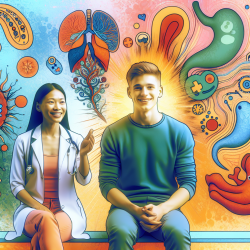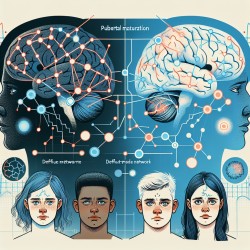Introduction
In the realm of pediatric therapy, the importance of a data-driven approach cannot be overstated. A recent study titled "Change in Urinary Inflammatory Biomarkers and Psychological Health with Gut Microbiome Modulation after Six Months of a Lifestyle Modification Program in Children" provides valuable insights that can significantly enhance therapy outcomes for children. This research highlights the profound impact of lifestyle modifications on the gut microbiome, inflammatory biomarkers, and psychological health in overweight adolescents.
Understanding the Study
The study involved 22 overweight/obese (OW/OB) adolescents and 16 healthy controls. Over six months, the OW/OB group underwent a lifestyle modification program, which included dietary adjustments and increased physical activity. The researchers collected data on urinary inflammatory biomarkers, psychological parameters, and gut microbiome composition at the start and end of the study.
Key Findings
The study revealed several critical findings:
- Reduction in Inflammation: The lifestyle interventions led to a significant decrease in urinary inflammatory markers such as TNF-alpha and IL-6 among the OW/OB adolescents.
- Improved Psychological Health: Participants showed improvements in mental health, particularly in areas like internalization, attention, and externalization.
- Gut Microbiome Modulation: Changes in the gut microbiome composition were observed, with an increase in Firmicutes and a decrease in Bacteroidetes, indicating a shift towards a healthier microbial balance.
Implications for Practitioners
For speech-language pathologists and other pediatric therapists, these findings offer actionable insights:
- Holistic Approach: Consider incorporating lifestyle modification strategies into therapy plans. Encourage families to adopt healthier eating habits and regular physical activity to support overall well-being.
- Monitoring Inflammatory Markers: Collaborate with healthcare providers to monitor inflammatory biomarkers in children, as these can provide valuable insights into their health status and therapy progress.
- Focus on Mental Health: Address psychological health as part of therapy, recognizing the interconnectedness of mental and physical well-being.
Encouraging Further Research
While this study provides compelling evidence, it also highlights the need for further research. Practitioners are encouraged to explore the following areas:
- Long-Term Effects: Investigate the long-term impact of lifestyle modifications on gut microbiome composition and overall health in children.
- Personalized Interventions: Explore personalized approaches to therapy that consider individual differences in gut microbiota and inflammatory markers.
Conclusion
The study underscores the potential of lifestyle modifications in improving mental wellness and reducing inflammation in overweight adolescents. By understanding the relationship between gut microbiota and psychological factors, therapists can enhance therapy outcomes for children. Embracing a holistic approach that integrates lifestyle changes into therapy plans can pave the way for more effective interventions.
To read the original research paper, please follow this link: Change in Urinary Inflammatory Biomarkers and Psychological Health with Gut Microbiome Modulation after Six Months of a Lifestyle Modification Program in Children.










